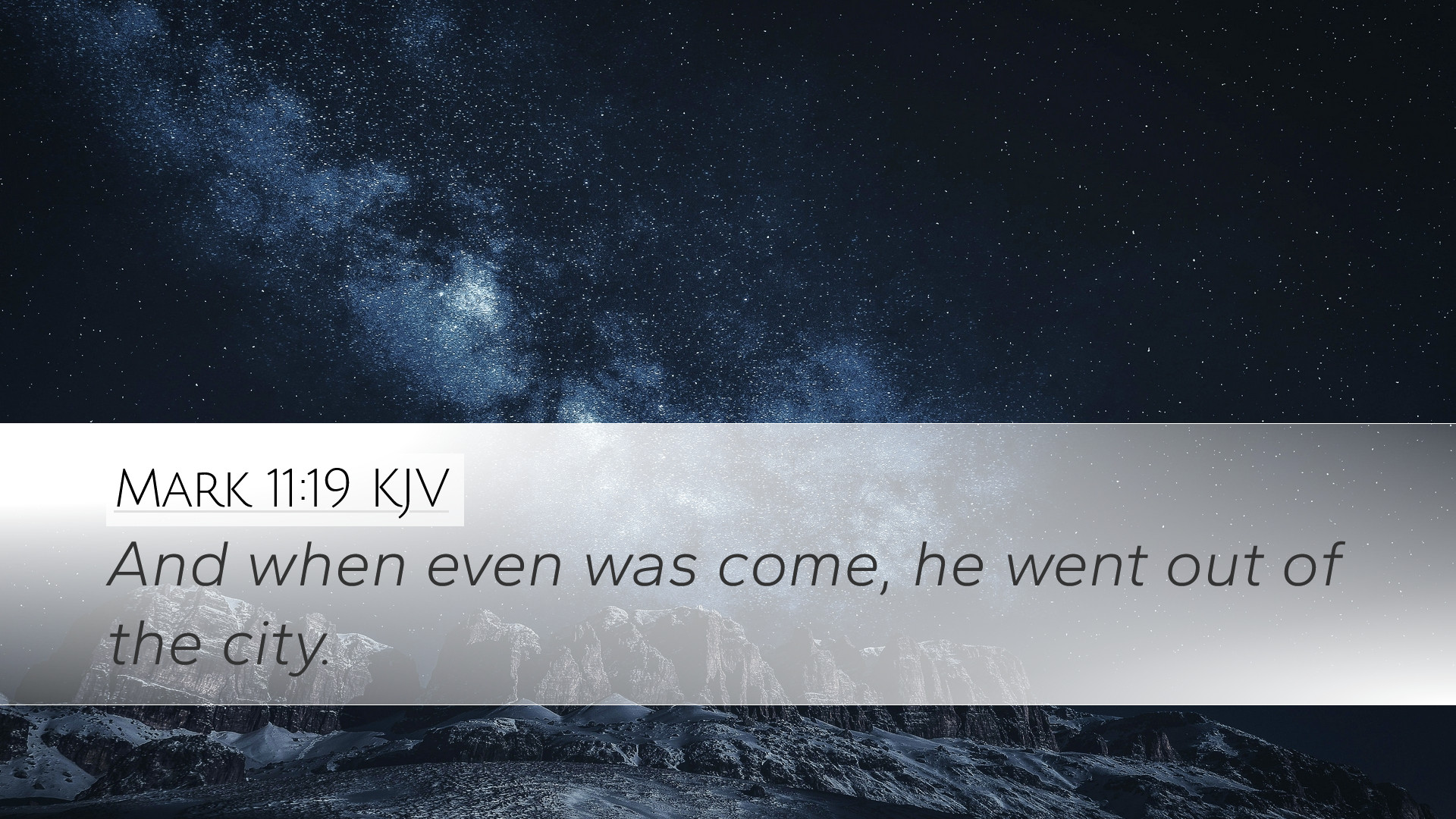Commentary on Mark 11:19
Mark 11:19 states:
“And when evening was come, he went out of the city.”
Contextual Analysis
To fully understand the depth of this passage, one must consider its context within the narrative of the Gospel of Mark. This verse occurs after Jesus' triumphal entry into Jerusalem and the confrontation with the money changers in the temple, showcasing a pivotal moment in His ministry.
The Significance of Time
Matthew Henry remarks on the timing of this event. The phrase “when evening was come” serves to highlight the conclusion of a day filled with significant actions. This transition from day to evening may symbolize a movement from public acclaim to a quieter, more introspective moment, illustrating the weight of Jesus’ mission.
The Importance of Location
Albert Barnes comments on the geographical setting of the narrative. Jesus "went out of the city," indicating a physical departure that may carry spiritual implications. Leaving the city represents an impending judgment upon Jerusalem, underscoring the seriousness of their rejection of Him.
Spiritual Symbolism
Adam Clarke provides insight into the symbolism of this action. The act of leaving the city can be seen as an early foreshadowing of the coming desolation that would befall Jerusalem due to its failure to recognize the Messiah. This withdrawal echoes Old Testament themes where the presence of God departs from a people due to disobedience.
Contrast Between Day and Night
Further, the contrast between day and night holds theological significance. The day represents the fulfilling of God’s kingdom, while night often symbolizes darkness and despair. In Mark 11:19, this transition may signify Christ's recognition of the darkness that looms over Jerusalem due to spiritual blindness.
Jesus' Authority and Judgment
Henry highlights that Jesus, by His actions, was asserting His authority over the religious structures of Jerusalem. His departure from the city hints at His impending judgment against it, indicating that the time for reckoning had approached. Thus, the verse beckons readers to consider the implications of Jesus' authority and the seriousness of what it means to reject it.
Practical Applications
The insights gleaned from this verse can serve as a reflective point for today’s believers and ministers. Considerations include:
- Self-Reflection: Just as Jesus left the city, believers are called to examine their spiritual landscapes. Are they welcoming the presence of Christ in their lives, or are areas marked by barrenness and rejection?
- Awareness of Spiritual Conditions: The departure from the city prompts a deeper examination of one's spiritual condition and communal faithfulness. What judgments await those who fail to recognize and embrace Christ fully?
- Mission Driven by Urgency: The acknowledgment of evening as a metaphor for the urgency of the Gospel message. Pastors and theologians should use this understanding to inspire believers to spread the truth of Christ fervently, understanding that time is precious.
Theological Implications
This concise verse encapsulates the overarching themes of rejection, judgment, and the necessity of recognizing Jesus’ authority. It serves as a reminder that while Jesus offers salvation, He also presents a call to accountability. Understanding the implications of Mark 11:19 encourages a holistic view of Jesus’ ministry and its relevance to contemporary faith.
Conclusion
Mark 11:19 thus invites pastors, students, and theologians alike to reflect on the actions of Christ in the larger narrative. This verse not only signifies a moment in time but also holds profound truths about the human condition in relation to divine authority. Each insight underscores the need for vigilant readiness to embrace Christ, lest we find ourselves in the shadows of spiritual neglect.


